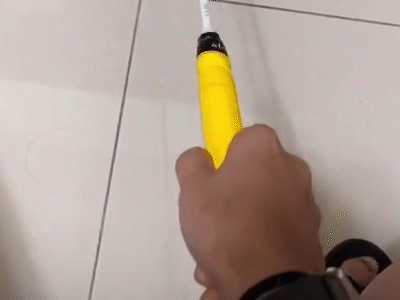Unit4 Review
1On my way to School, I go by a park.在我去学校的路上,我经过一个公园。
1.1on one's/the way to(某人)去……的路上。
1.2go past/by走过/路过
2. Danny is going to school. He sees a bakery, but he doesn't stop. He goes past the bakery.丹尼要去学校,他看到一家面包店,但他没有停止。他走过那家面包店。
3. My room is across from my brother's room.我的房间在我弟弟的房间的对面。
3.1across from在……对面;在……对过。
4. The dress looks good on you. It's prefect.这件连衣裙你穿着很好看,它是完美的。
5. He is a journalist. He has interviewed many famous
people.他是一名记者。他已经采访了许多名人。
6 I live in a small but nice village. I love it because it's quiet, and there are a lot of trees. My friends and I often play football on the field near my house. However,after it rains, the field is too wet to play on.We like to walk along the river. We can smell the flowers and listen to the birds. It is very enjoy -able. My village is comfortable place to live in.
我住在一个小而美丽的村庄里。我喜欢它,因为它宁静,并且有许多树。我和朋友们经常在我家附近的田地里踢足球。
然而,雨后田地里太湿不能在上面踢。我们喜欢沿着河散步。我们能闻到花香,听到鸟叫,非常令人愉快。我的衬庄是适合居住的舒适的地方。
6.1too...to的用法语法:too adj./adv. to do表示“太.......而不能.....”。如在too前有否定词,则整个句子用否
定词表达肯定, too 后那个词表达一种委婉含义,意为"不太"。
一、too...to的常见用法:
一般情况下“too.... to ”表示否定意义“太........而不.....
He is too shy to give a speech.他太害羞,不敢做演讲。
(1)当主语不是人的时候(即主语是不定式动作的承受者),不定式既可以是主动也可以是被动。
The milk is to hot to drink/to be drunk.牛奶太烫了,喝不了。
(2)在句中加上for sb.表示该动作行为只是就它的逻辑主语而言。
Math is too difficult for me to learn well.数学太难,我学不好。
二、too...to的特殊用法:
在下列情况下,"too...to"结构可以表示肯定意义:
⑴“too....to”结构之前带有but, only, all, never, not时,是强调肯定的表示法,译作“非常......、十分.....、实在......、真是太.....”等。
I'm but too happy to hear that.得知那个消息我太高兴了。
⑵“too...to”结构中带有表示某种心情或描绘性的形容词或副词,如ready,eager,satisfied,kind,willing,
easy,anxious等加动词不定式,表示一
种状态、态度、倾向或心情等,其后的不定式不是说明too的具体内容,而是修饰形容词。
例:Lei Feng was too ready to help others.雷锋同志乐于助人。
⑶在“too...to”结构中,不定式为否定式时,是构成的双重否定,其意为“非常(很,太,那么).....不会不(必定能,所以能.)....
He is too kind not to help you.他很善良,不会不帮助你。

7It took him an hour to get to the station because he got lost.他花了1个小时到达车站,因为他迷路了。
7.1It takes sb. some time to do sth.
某人花时间干某事。
7.2get to the station到达车站。
7.3get lost迷路。
8 I really like this movie because
it was very interesting.我真地喜欢这部电影,因为它非常有趣。
9The little boy took off his coat because it was very hot.小男孩脱下了他的外套,因为天气非常炎热。
9.1take off脱下,反义词为put on穿上。
另take off还有“起飞”的意思。
注意:take off属于动词 副词结构。
10Mary was late this momning because her clock didn't work.
玛丽今天早上迟到了,因为她的钟坏了。
10.1work不及物动词,意为“(机器等)运转;(计划)行得通通。
11You can't go to school because you are not old enough.你不能去上学,因为你不够大。
11.1because的用法
because引导的原因状语从句一般放于主句的后面,because从句位于句首时要用逗号分开,放在句末时,可不用逗号分开。because表示直接原因,语气最强,最适合回答why引导的疑问
句。
11.1.1because引导原因状语从句
(1) Because he is my friend, I believe him.因为他是我的朋友,(所以)我相信他。
(2) I believe him because he is my friend.我相信他,因为他是我的朋友。
11.1.2because从句与because of短语的转换Because引导的原因状语从句有时可与becauseof 短语转换。
(1) He can't come because he is ill./He can't come because of his illness.他因病不能来。
(2) I said nothing about it because his wife was there./I said nothing about it because of his wife's being there.因为他妻子在那儿,我对此事只字未提。
12 I live in downtown Shanghai. It is a very big and busy city.When I first moved here, I often got lost on my way to school. However,I don't get lost anymore. My mum showed me the big bank near my school. She told me if I go past it, then I am going the right way. On weekends, I like to walk along Nanjing Street. There are many stores there, and
they are always filled with customers. This is a lovely city. When my friends come to visit, I always have so much to show them.
我住在上海市中心。上海是一个非常大而且繁华的城市。当我最初搬到这儿时,我经常在上学的路上迷路。然而,我不再迷路了。我妈妈指给我看学校附近的大银行。她告诉我如果我走过它,那么我走的路是对的。在周末,我喜欢沿南京路走。那里有许多商店,里面总是挤满了顾客。这是一个充满生机的城市。当我的朋友来游览时,我总有如此多(东西)给他们看。
12.1downtown用作副词的意思是“在商业〔闹市〕区”,“往商业〔闹市〕区”。①作“在商业〔闹市〕区”解时,一般与静态动词(如live)连用;
②作“往商业〔闹市〕区”解时,往往与动态动词(如come, go, move等)连用,表示运动的方向。
③反义词是uptown。
12.2get lost on one's way to...在去……的路上迷路。
12.3not...anymore不再
12.4show sb. sth.给某人看某物;给某人展示某物。
12.5go past走过/路过
12.6go the right way走在正确的路上。
12.7walk along...沿……走。
12.8be filled with与be full of的区别:
①be full of强调主动的充满,某物充满某物,而be filled with强调被动的充满,即某物被某物充满。
②be full of“充满”。用法:在句中作表语或后置定语。是主动结构,侧重于满的状态
The bottle is full of water.瓶子里装满了水,形容满的状态。
③be filled with的意思是“把东西放满某物里面”。是被动结构,强调被充满,侧重于动作和装的东西,一般容器做主语。
例句:fill the cup with wine .杯子装满了酒。相当于The cup is filled with the wine.
④重点辨析:be filled with中filled是装满,加满的意思,这个词成为被动的关键在于with,with通常会翻译成动词,可以理解为用什么东西填满,而full是形容词,意思是满的,与of组成短语be full of,表示主动结构。
12.8I always have so much to show them.中have是动词“有”的意思,故其后接动词不定式时,to不能省略。
so much如此之多,修饰不可数名词。

13A: I've got two tickets for tomorrow's football match.Would you love to go with me.我有两张明天足球赛的票。你愿意和我一起去吗?
B: Yes, I'd love to. When and where shall we meet?是的,我愿意。我们在何时、何地见面?
A: How about 9 o'clock tomorrow morning at the gate of the Yuhua Gym?明天上午9点钟在育华体育馆门口怎么样?
B: All right. But how can I get there?好的。但我怎么到那儿昵?
A:You can take a bus.你可以乘坐公交车。
B: Is it far from here?离这儿远吗?
A:Yes.It will take you two hours to get there.是的。到那儿你将花费2个时。
B: OK. See you tomorrow.好的。明天见。
14Neighbourhood Dogs社区里的狗
14.1Buddy and Teak were two dogs. They lived in the same neighbourhood. They loved each
other and played together every day.巴迪和蒂克是两只狗。它们生活在同一个社区,它们相互喜爱,每天在一起玩。
14.2One evening,Buddy didn't come home.David and his family went out to look for him,but they had no luck finding him. To their
surprise, Teak came to their house alone and started barking.David's family didn't know why.一天晚上,巴迪没有回家大卫和他的家人出去找它,但他们不走运、未能找到它。使他们感到奇怪的是,蒂克独自来到他们的家,开始叫。大卫的家人不知道为什么。
①have luck (in) doing something做某事有运气/好运。
②to one's surprise是某人感到惊起/惊讶。
③alone形容词,意为“单独的”,只作表语,不能作定语。侧重说明独自一人,只表示客观的状态。lonely意为“孤独的”,表示主观上感到孤独、寂寞,它为形容词,在句中作表语或定语。意为“荒凉;偏僻”,多修饰表示地点的名词。
i含义不同:alone是指行为或动作上的,译为单独,独自。lonely是指心灵上的,译为寂寞,孤独。如:I don't like going out alone at night.我不喜欢夜晚单独外出。
ii词性不同:lonely是形容词,一般不作状语,alone是副词, 意思是“单独地”,“独自”。如:She lives alone and often feels lonely.她孑然一身,常感到寂寞。
iii地点的使用:lonely可用于地点,表示“偏僻,人迹罕至”,而alone不能这样用。
④start doing sth.开始干某事。
14.3Teak didn't stop barking. He barked at anyone he could see. One morning, Teak Followed David around, barking loudly and running towards the woods as if to say,“Follow me!”蒂克不停地叫。它向它看见的任何人叫。一天早上,蒂克跟随在大卫身边,大声叫着并跑向树林,仿佛在说:“跟我来!”
①stop doing sth.停止干某事
②bark at sb.向某人吠叫。
③follow sb. around跟随在某人身边。
④bark loudly大声叫
⑤as if to say仿佛在说。
14.4The little dog led David towards the woods.There, the boy found Buddy stuck in a hole with
a hurt leg. Around him was some dog food. David knew it was Teak's food from home. David suddenly realized that Teak had brought this food to his friend!这只小狗领着大卫走向树林。在那里,男孩发现巴迪卡在一个洞里,一条腿受了伤。在它周围有一些狗粮。大卫知道这是蒂克从家里拿的食物。大卫突然意识到蒂克已经给它的朋友拿来了食物!
①lead sb. towards the sp.领着某人走向某地。
② the boy found Buddy stuck in a hole with a hurt leg.其中stuck in a hole with a hurt leg为过去分词短语作宾语补足语。
③stuck是动词stick卡住,陷入的过去分词。
14.5David helped to free Buddy and get his leg treated. For many years, the two families watched their dogs play happily together.
大卫帮助巴迪脱身,并且让人治疗它的腿。许多年了,这两家人看着他们的狗一起快乐地玩耍。
①get/have sth. done使某物被……;让别人做某事。
done是过去分词作宾语补足语,含有被动的意思。
1. Buddy and Teak were good friends:(T)巴迪和蒂克是好朋友。
2. Buddy did a lot for Teak when he was stuck in the woods.(F)当蒂克卡在树林里时,巴迪为它做了许多。
①do a lot for sb.为某人做许多事。
3. Buddy's family found him with the help of Teak.(T)在蒂克的帮助下巴迪的家人找到了它。
①with the help of sb.在某人的帮助下。
4Buddy and Teak lived together in
the same family.(F)巴迪和蒂克一起生活在同一个家庭里。

15make a poster!制作一张海报。
15.1You want to help your city by convincing more tourists to come to visit.你想通过劝说更多的游客来游览,来帮助你的城市。
①介词by的用法
i靠近;在……旁边;在……附近(相当于near, beside, next to, close to等等)
The telephone is by the window. 电话在窗户旁边。
We had a day by the sea. 我们在海边度过了一天。
ii经过(相当于past;联想词组pass by)
I go by the church every morning on my way to work.我每天早晨上班要经过教堂。
iii不迟于;在……之前(相当于before;联想词组by the end of )
By this time next week we shall be in New York.下周的这个时候我们就会在纽约了。
He ought to have arrived by now.此刻他早该到了。
iv乘坐(交通工具)
I go to school by bus.我坐公交车去上学。
v用于被动语态
The play was written by Shakespeare.这部剧是由莎士比亚写的。
vi通过(某物或某地相当于through);通过(某种方式或手段);凭借。
He entered by the back door.他从后门进来了。
He earns his living by writing. 他靠写作为生。
vii按照(一定的标准);以……为计量
sell eggs by dozen 卖蛋论打
The children came in two by two.孩子们两个两个地进来。
The carpet is too short by three feet.这块地毯短了三英尺。
viii根据(相当于according to)
It's two o'clock by my watch.我的表现在是两点钟。
I could tell by the look on her face that something terrible had happened.
我一看她脸色就知道出大事了。
vv抓住某人的身体或衣物 take sb. by hand 抓住某人的手
②词组
go by 路过
drop by 顺便拜访
pass by 经过
stand by 坐视不管;袖手旁观
by accident / by chance / by mistake 偶然
by oneself 独自;独立
by the way 顺便一说(用于转移话题)
③辨析
i.by / with / in 表示 ”用“
by 表示使用的方式或手段,无需限定词。如iby bus 乘车 by gas 用气 by letter 用信
ii.with表示使用具体的工具或手段,需要限定词。如:
I write with my left hand.我用左手写字。
I write this letter by hand.我用手写的这封信。
iii.in表示使用某种语言或材料,无需限定词。如:
What's this in English? 这个用英语怎么说?
Write your homework in ink.写作业要用墨水笔。
vi.by sea & by the sea
by sea 表示“乘船”;by the sea 表示 “在海边”
②convince sb. to do sth.劝说某人干某某。
15.2 Make a poster to advertise your city. 制作一张海报为你的城市做广告。
①make意思为“制作,制造”时,不是使役动词,其后接动词不式,to不能省略。
②advertise动词,为……做广告
15.3Describe your city and write why it is an interesting place to visit. 描述你的城市并写出它为什么是一个可以游览的有趣的地方。
15.4You can draw pictures or get them from magazines.你可以画画或从杂志上剪取。
15.5Make your poster beautiful!使你的海报漂亮!






